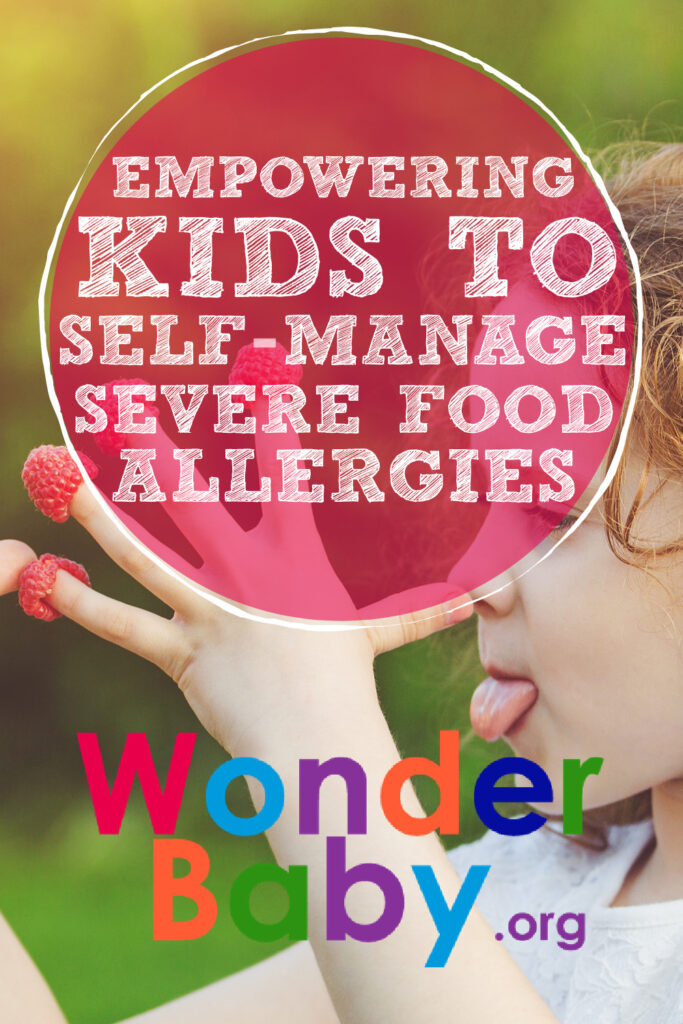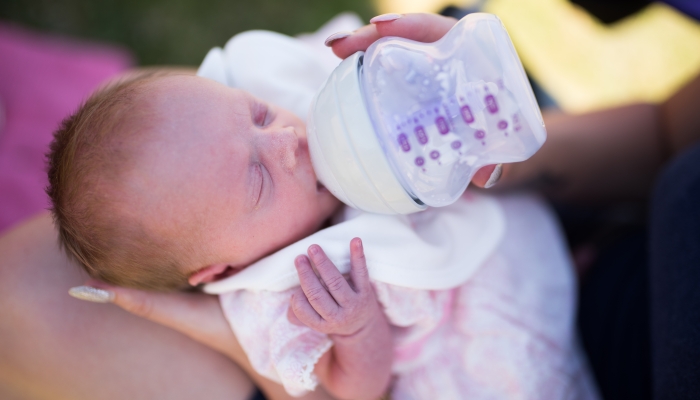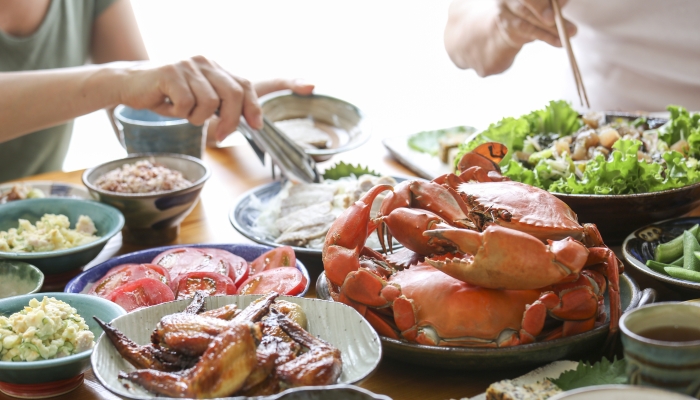Empowering Kids to Self-Manage Severe Food Allergies

This post may contain affiliate links; please see our terms of use for details.
- Your child can successfully learn to manage their food allergies.
- Strategies for self-management of food allergies involve teaching a variety of skills.
- Support your child through idea sharing and identifying resources.
“Growing up means letting go.”
In the early days of having children, I found we could accomplish more in less time if I did certain tasks for them. Whether it was picking out clothes or tying shoes, I did it all—often while the people I was trying to “help” loudly proclaimed, “I can do it myself!”
I felt anxious about our daily routine and wondered how it was that I was rushing around while my children idled. A dear friend then reminded me that “growing up means letting go.” She reminded me that, in sacrificing autonomy for efficiency, I was doing my children a disservice by not allowing them to do these tasks themselves.
Shifting the burden of managing a child’s food allergies from our shoulders to theirs can feel much the same way. Often, parents have successfully managed all the necessary precautions and accommodations for years; it can feel scary to begin to step back and let our children take the lead in learning to manage their health.
There are many ways adults can successfully empower kids with food allergies to manage themselves, take proper precautions, and make correct preparations when dining away from home.
Wondering how to begin this process with your child? Consider the following tips and strategies as you work to empower your child.
Strategies for Self-Managing Food Allergies

Equipping our children for their future is an important part of their growth and development.
According to a 2022 study by Dr. Andrea Pappalardo et al titled “Self-Efficacy Among Caregivers of Children with Food Allergy: A Cohort Study”11. Pappalardo, A. A., Herbert, L., Warren, C., Lombard, L., Ramos, A., Asa’ad, A., Sharma, H., Tobin, M. C., Choi, J., Hultquist, H., Jiang, J., Kulkarni, A., Mahdavinia, M., Vincent, E., & Gupta, R.. Self-Efficacy Among Caregivers of Children With Food Allergy: A Cohort Study. Journal of Pediatric Psychology. 2022;47(6), 674–684. https://doi.org/10.1093/jpepsy/jsab137 published in the Journal of Pediatric Psychology, children and families who are confident in their ability to manage their food allergy showed an improved quality of life and reduced perceptions of risk and food allergy severity.
Using your child’s age as a guide to how much and what to teach is an important part of shifting the responsibility of food allergy management to them.
There are many different strategies you and your child can use to develop self-management skills, such as:
Developing a Management Plan
A written management plan is usually required by your child’s school and is renewed before or at the beginning of each school year. This plan is important because it alerts all parties (kids, parents, your child’s school, etc.) of your child’s condition and who is responsible for managing food allergies and allergic reactions.
According to the experts at the American Academy of Pediatrics, at a minimum, a written allergy management plan22. Wang, J., Sicherer, S. H., Matsui, E., Abramson, S., Dinakar, C., Irani, A.-M., Kim, J. S., Mahr, T. A., Pistiner, M., & Wang, J.. Guidance on Completing a Written Allergy and Anaphylaxis Emergency Plan. Pediatrics. 2017;139(3). https://doi.org/10.1542/peds.2016-4005 needs to include the following elements:
- A listing of your child’s food allergens (including products that may contain these substances if your child’s food allergy is not included in the top nine allergens33. Common Allergens. FoodAllergy.org. 2023. https://www.foodallergy.org/living-food-allergies/food-allergy-essentials/common-allergens.)
- Symptoms of allergic reaction, including anaphylaxis44. Anaphylaxis. American Academy of Allergy Asthma & Immunology. https://www.aaaai.org/conditions-treatments/allergies/anaphylaxis
- Steps to take in the event of exposure
- A list of emergency medications to be given to treat an allergic reaction
Involving your child in the creation or adjustment of an allergy management plan is an important step. This plan follows them throughout their school day and your children may have specific ideas about the necessary accommodations required to successfully manage their food allergy away from home.
Teaching Children to Recognize Allergens
Work with your children throughout their growing-up years to learn where their allergens occur in foods (including ethnic dishes), vitamin and dietary supplements, and cosmetics55. INCI Database Directory. INCI Database: International Nomenclature of Cosmetic Ingredients. https://cosmetics.specialchem.com/inci-names.
Label reading and interpreting an ingredient list are also important skills in preventing cross-contamination accidents between allergenic and non-allergenic foods.
With time and practice, children with food allergies will learn the difference between safe and unsafe foods and develop confidence in their ability to manage food choices independently.
Teaching Children to Communicate About Their Allergy

As our children grow, they will naturally spend more of their time away from home and the presence of their parents.
Teach your child how to correctly read food labels, identify safe foods, avoid cross-contamination, and ask for help when needed. Having these skills in place will serve them well in communicating with other adults at events like after-school activities or a friend’s house.
Showing children how to communicate their allergy to others may look like:
Role-playing scenarios
Children are naturally curious and will ask questions about what they don’t understand.
Role-playing conversations about the need for different foods or safe snacks for classroom celebrations may help ease the burden for your child of having to create an appropriate response at the moment.
Encouraging children to speak for themselves
Give children a chance to speak and advocate for themselves—they might just surprise you.
One of my proudest moments in the journey towards self-advocacy occurred when my child with food allergies was about four.
We were walking towards a college football stadium to watch a game and students were handing out doughnuts and treats to attendees. One young lady offered my child a doughnut with frosting and nuts, whereby my child piped up, “I can’t have that because I’m allergic to nuts, but thanks anyway!”
I knew then that we were on the right track with encouraging them to take ownership of their food allergy.
Educating peers and adults about food allergies
In my experience, educating others about food allergies and allergic reactions usually involves a simple conversation about the offending foods and how to avoid them.
I’ve learned that people generally don’t want an in-depth explanation and the child with the allergy usually doesn’t want more attention brought to the fact that they’re “different.” If more information is needed to know how to manage specific situations that involve food, the other person will ask.
Children’s shows, like Daniel Tiger’s Neighborhood, can do a good job of explaining food allergies to very young children.
Asking for help
It’s scary for a child to be unsure in a situation that involves food and not know how to manage it or what to do next.
Teach your child that it’s okay to approach the adult in charge and ask them to help read labels or if they can find out what allergens are in a food or product before the child eats them.
Asking for help, even if embarrassing or awkward, is always better than risking a food allergy emergency66. Food Allergy & Anaphylaxis Emergency Care Plan. FoodAllergy.org. 2023. https://www.foodallergy.org/living-food-allergies/food-allergy-essentials/food-allergy-anaphylaxis-emergency-care-plan by guessing and eating an unknown product.
Talking about your child’s food allergy and including it as a natural part of your family’s life helps these communication skills become second nature.
Teaching Kids to Use an Epinephrine Auto-Injector
Many written resources and videos are available to teach kids of all ages how to safely give themselves medication via epinephrine auto-injectors to stop anaphylaxis.
When my child was young, we practiced giving injections with the trainer pen (included in many medication packages) on stuffed animals and ourselves to help build muscle memory. Now that my child is older, we use the actual expired pens to inject oranges to maintain skills.
Teach your child the symptoms of an allergic reaction, including anaphylaxis, and how to give themselves life-saving medications.
Supporting Your Child

Sometimes it’s hard to be a child with food allergies. Kids are aware of the physical differences of those around them and it can feel isolating to have to pass on certain foods or not enjoy an experience in the same way as other children.
As parents of kids with food allergies, we can provide support for our children in many different ways as they adjust to their accommodations and learn to self-manage their condition.
Encourage Self-Management While Providing Support
I have vivid memories of teaching my child how to announce their life-threatening food allergies when dining out and requesting food allergy accommodations. My child doesn’t like drawing attention to themselves, especially when it makes them feel “different.”
Depending on the situation, you could try a variety of methods to support your child in their ability to manage their allergy, such as:
Rehearsals
Role-playing is a wonderful tool to help kids practice asking and answering questions about food allergens, as well as learning how to self-advocate in real-time.
When my child with food allergies was much younger, we would role-play conversations with wait staff at restaurants and practice how to order appropriate food selections. These practice sessions went a long way towards helping my child feel more confident in expressing their needs to other adults outside our family.
Encouragement without requirements
When teaching self-advocacy to my child, I would encourage them to practice announcing their food allergy to the serving staff at our favorite ice cream store but not make it conditional.
In other words, my child would get the ice cream whether or not they provided the information themselves.
If they couldn’t do it, for whatever reason, I would step in, describe the food allergy, and outline what modifications might need to be made.
Sometimes, as my food-allergic child says, “You just want to eat ice cream and not explain everything every time.”
Medical play
All children learn about the world around them and their experiences through play. Play is a wonderful way to explore new concepts in an age-appropriate way in a non-threatening environment.
When a child has a chronic medical condition that requires them to self-administer medications, it can be invaluable to do some simple medical play to help them learn new skills.
Playing pretend with a simple child’s medical kit on a favorite stuffed animal can help remove the fear from tasks like taking a temperature, getting a blood pressure measurement, or looking in a child’s ears.
- 25-piece doctor’s kit play set with realistic pretend play patient care essentials to examine and treat patients
- Includes play stethoscope, blood pressure cuff, hearing tester, syringe, scissors, tweezers, rolling forehead thermometer, reflex hammer, otoscope, eye cover, tongue depressors, bottles, ID badge, activity cards, and more
- Pieces store in handy tote for easy cleanup and so aspiring young doctors can make house calls; styles and colors may vary
- A fun and engaging way to ease any feelings of stress associated with a visit to the doctor and to encourage imaginative, nurturing, and empathetic play
“Say anything”
Frustration levels can be high for your child when they can’t safely attend special occasions like their friends or have to leave birthday parties before serving special food products.
Processing grief and frustration is a big part of learning to live with a chronic health condition like food allergies. Healthy coping can be encouraged by allowing your child to freely express their feelings through drawing, screaming into a pillow, hitting a punching bag, or (when my kids were smaller) banging a pot with a spatula.
Offer a safe space
Sometimes our kids just want to know we hear their grief and frustration while allowing room for their mistakes.
We as parents of kids with food allergies have a lot of practice in managing their dietary requirements and keeping our children safe. As kids learn, often at a young age, to begin to self-manage their food allergies, some mistakes are inevitable.
Offering an open, non-judgemental attitude to your child as they learn food allergy management will help boost their self-confidence and ability to successfully manage their allergies themselves.
Peer support groups
Sometimes, there’s nothing like spending time with other kids who innately understand the challenges of living with and managing food allergies.
Many allergist practices offer peer support groups for their children with food allergies. Groups can also be found through national organizations like Kids with Food Allergies77. Food Allergy Programs for Families and Caregivers. Kids With Food Allergies. 2023. https://kidswithfoodallergies.org/about-us/programs.
Contact your child’s doctor or allergist for further information on peer support groups in your area.
Identify Supportive Adults

As your child develops their label-reading and self-advocacy skills, it can be helpful to talk with them about which adults in their daily lives can help them when needed.
Whether your child is in elementary school or middle school, your child’s teacher will probably be their go-to person in terms of answering immediate questions about how to manage food allergies or treating an allergic reaction. Other school staff members, such as a school nurse or secretary, are also valuable resources.
Other caregivers, such as those at before/after school care programs for younger children, are also important people in your child’s daily life and should have the same information about your child’s food allergy as their teacher does during the day.
Build a Supportive Network With Your Child
Many parents—and kids—worry about what will happen if a food allergy emergency occurs in social settings other than home or school.
Teach your child that help is always available, wherever they are.
Whether it’s a coach or program director for extracurricular activities, a chaperone on field trips, a parent at a playground, a movie theater attendant, restaurant staff, or an employer, it’s the nature of people to want to help when someone is experiencing a severe allergic reaction or other emergencies.
Living With Severe Food Allergies: A Child’s Perspective

For many years, I’ve been empowering my child to self-manage their severe food allergies. I asked my child if they would be willing to share their thoughts on how to manage their dietary requirements and accommodations with other children and parents who may be new to food allergy management.
Below are excerpts from our discussion:
What advice would you give to a child newly diagnosed with a food allergy?
“Hang in there—it’s going to be okay. You’ll learn what you can and can’t eat, and your parents and teachers will help you if you don’t know what to do or what you can eat.”
“Allergy-friendly foods aren’t exactly the same, but they’re okay.”
“Knowing how to read a food label correctly is super important and it means I know exactly what I can and can’t eat and if I need to find another choice. It’s also important because my parents aren’t always with me when I’m eating somewhere.”
What are things parents can do to help their kids with food allergies in school?
“Make sure you have lots of your own snacks in the classroom and switch out the types of snacks often. It gets boring eating the same stuff over and over.”
“I like it when you make a treat for the whole class when we celebrate holidays because then I know I can eat it. I know it isn’t possible all of the time but it’s great when it happens.”
Is it scary to think about giving yourself an epinephrine auto-injector?
“It’s not scary to give myself an Epi-Pen because I know how to do it. I’m not worried about the needle because I know if I need the medicine it will save my life. I’m willing to put up with it.”
What do you think parents of kids with food allergies should remember about their kids?
“We are kids first. Food allergies are a small part of who we are but they don’t define us. What defines us is who we are as people and not what we can eat.”
“When I go to a friend’s house I don’t worry about my allergies because I know how to take care of it and that there are people there I can trust to take care of me and they’ll call if they have questions.”
Any final thoughts?
“Kids with food allergies—everybody’s different in some way and you’re not the only one. It gets better the more you practice and eventually you won’t think about it as much. Your allergy doesn’t define you.”
References
- Pappalardo, A. A., Herbert, L., Warren, C., Lombard, L., Ramos, A., Asa’ad, A., Sharma, H., Tobin, M. C., Choi, J., Hultquist, H., Jiang, J., Kulkarni, A., Mahdavinia, M., Vincent, E., & Gupta, R. (2022). Self-Efficacy Among Caregivers of Children With Food Allergy: A Cohort Study. Journal of Pediatric Psychology, 47(6), 674–684. https://doi.org/10.1093/jpepsy/jsab137
- Wang, J., Sicherer, S. H., Matsui, E., Abramson, S., Dinakar, C., Irani, A.-M., Kim, J. S., Mahr, T. A., Pistiner, M., & Wang, J. (2017). Guidance on Completing a Written Allergy and Anaphylaxis Emergency Plan. Pediatrics, 139(3). https://doi.org/10.1542/peds.2016-4005
- Common Allergens. FoodAllergy.org. (2023). https://www.foodallergy.org/living-food-allergies/food-allergy-essentials/common-allergens
- Anaphylaxis. American Academy of Allergy Asthma & Immunology. (n.d.). https://www.aaaai.org/conditions-treatments/allergies/anaphylaxis
- INCI Database Directory. INCI Database: International Nomenclature of Cosmetic Ingredients. (n.d.). https://cosmetics.specialchem.com/inci-names
- Food Allergy & Anaphylaxis Emergency Care Plan. FoodAllergy.org. (2023). https://www.foodallergy.org/living-food-allergies/food-allergy-essentials/food-allergy-anaphylaxis-emergency-care-plan
- Food Allergy Programs for Families and Caregivers. Kids With Food Allergies. (2023, January 17). https://kidswithfoodallergies.org/about-us/programs

The information WonderBaby provides is not intended to be, and does not constitute, medical or other health advice or diagnosis and should not be used as such. Always consult with a qualified medical professional about your specific circumstances.
Related Posts

Feeding and Eating, Special Needs
Feeding Therapy Approaches for Infants with Special Needs
Many children with special needs have feeding difficulties. Working with a speech therapist, being patient, and experimenting with textures can help.

Feeding and Eating
Unexpected Foods That Cause Allergen Cross-Reactivity
A variety of unexpected foods and environmental substances can trigger an allergic reaction through cross-reactivity to food proteins.

Feeding and Eating
Easing Anxiety for Families Facing Food Allergies
Ongoing physical preparations and speaking openly about anxiety can ease the transition from diagnosis to living well with a food allergy.
